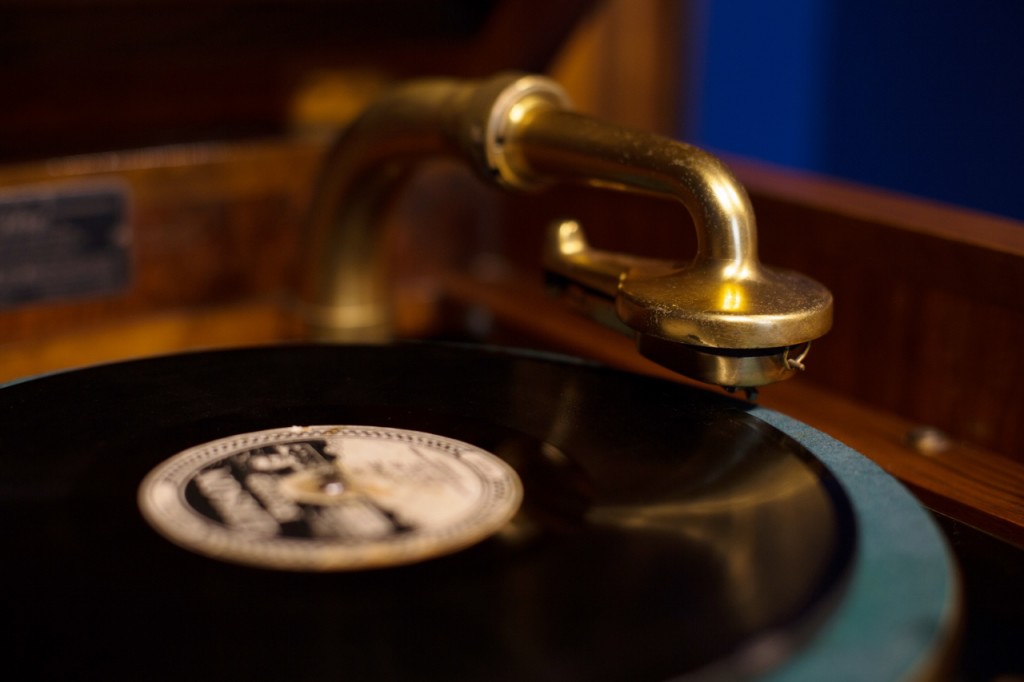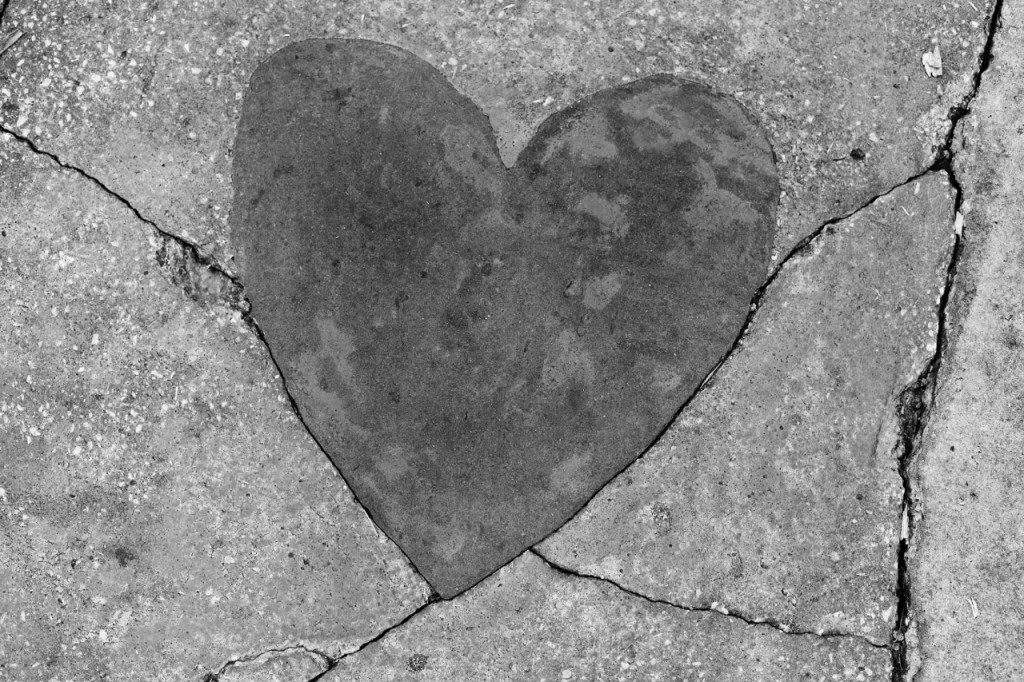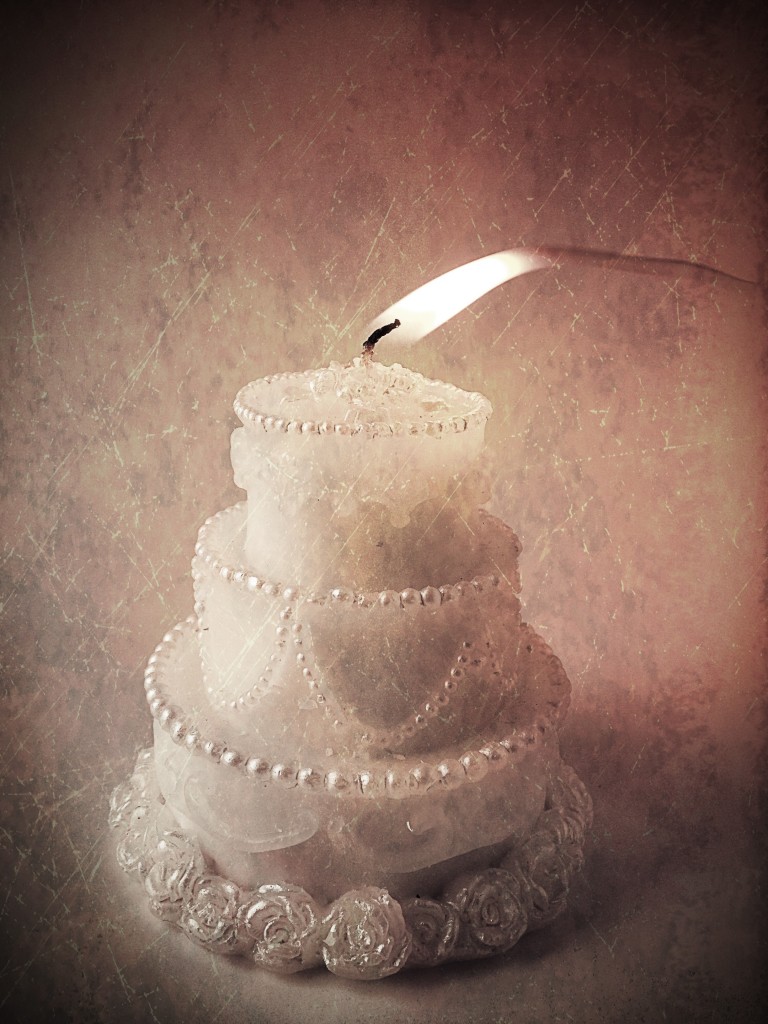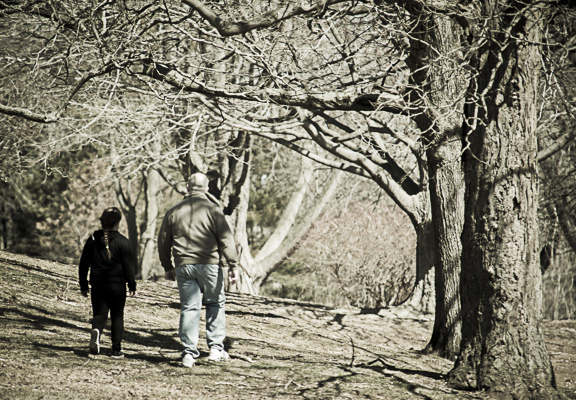
By Kelly Shire
I already loved the desert before I’d met Mike. I’d been seduced during a long weekend a few years earlier, when I’d accompanied a friend to a wedding. I hadn’t paid much attention to the church ceremony, distracted by the spectacle of the San Jacinto mountains looming out the tall windows. Hours later, in the midst of the reception at a tony Palm Desert resort, I’d escaped the ballroom and swirling DJ lights to walk outside. Strolling alone across the dark golf course, the hot, dry breeze instantly calmed the restless want that so marked my early twenties, offered up the same release and luxurious solitude as sinking into a hot bath. I didn’t want to return to the party; I fantasized instead how I might arrange to stay behind when my friend drove back to L.A.
After returning home, my imagination kept returning to the desert. I wrote a short story about a woman who lived alone in a trailer on the outskirts of a grove of date palms. The wind blew at night, and the woman lay alone in bed, trying to decipher the curses and premonitions told in the clatter of palm fronds.
•••
I truly fell for the desert while riding shotgun in Mike’s black Cadillac. On a summer afternoon, we left his little ranch house in Orange County and headed east on the 60 freeway through traffic. His mother and younger sister, visiting from Oregon, rode in the backseat of the secondhand Caddy. Mike had grown up in Cathedral City, the shabbier eastern neighbor of Palm Springs, where his family had relocated when he was still in grade school. They’d followed in the footsteps of Mike’s maternal grandparents, who’d preceded them by a few years.
As soon as we exited the freeway to approach the Palm Springs city limits, Mike tuned the radio to KWXY, a station he said had been on the air forever. We drove down the main drag of Palm Canyon Drive, past shops and restaurants, the sidewalks nearly empty of tourists in the low season. We rode in silence, except for the radio. The station’s playlist consisted of the music one might associate with the desert’s huge population of golf-cart driving retirees: lush instrumentals, choral groups like the Ray Coniff Singers, and a sprinkling of mid-century pop standards. In short, KWXY played “beautiful music.”
When I’d first met Mike, he’d sported a long ponytail, cowboy boots, and a Metallica t-shirt. A later inspection of his large CD collection revealed mostly metal and guitar rock, but my fingers occasionally tripped over Kraftwerk, Neil Diamond, or ’80s funk, artists hinting at deeper complexities than his headbanger image suggested. I also often sported cowboy boots, pairing them with cut-offs and shirts knotted at my waist, a nod to my solidarity to both Lynyrd Skynyrd and Thelma and Louise. I didn’t fancy myself a good match for Mike, or for anyone, and had warned him of such. And yet here we were, nearly a year into our romance, cruising his home turf with his mom and listening to more music I’d never have guessed he enjoyed.
•••
KWXY had been the preferred station of Mike’s grandparents. Not so long before, they’d been an extremely active couple, using all the amenities of their gated mobile home community—the golf course and tennis courts, the themed dinners and bridge luncheons. We were there primarily to visit those grandparents, who’d remained in the desert long after Mike’s parents had decamped for the drastically opposite climate of Oregon. His grandmother was now in the later stages of dementia and had been moved to a nursing home.
This would be my first time meeting any of Mike’s grandparents; I’d met his immediate family only months earlier. Mike had invited me along on this journey to his home turf as a matter of course, but I worried how his mother, Brenda, felt about my presence. Unlike me, Mike was something of a serial monogamist. For all his parents knew, I was just another girlfriend who’d disappear a couple more years down the road.
•••
Brenda had booked us all into The Riviera, one of many older Palm Springs establishments claiming itself a former Rat Pack hangout. It was a sprawling hotel with faded carpets and a parrot in its tropical-themed lobby.
That night, after taking his reluctant grandpa out to dinner at a noisy chain restaurant, Mike and I lounged nearly naked on the private balcony off our room. It was late evening, but still well over ninety degrees. As with my previous wedding visit years before, my nerves were soothed by the heat as we chatted over a shared bag of melting M&Ms. Date beetles buzzed a shrill hum in the pepper and palm trees.
Our balcony faced west, toward the mountains; I could make out their silhouetted peaks against the dark sky. Mike pointed up, directing my eyes to a bright light near the top of the tallest mountain. He explained that it came from the tram station, over 8,500 feet up on Mt. San Jacinto. During the day tourists rode on gondolas suspended over a canyon of treetops and jagged boulders while steel cables pulled them thousands of feet up the mountain. The tram ride closed at sunset, but the station light remained on all night. Its beam winked down on us, a low-hanging star.
•••
The next morning we visited Mike’s grandma at her nursing home. I was already awkward around his family—my answers to his mom and sister’s questions alternately too complicated or flippant—so I retreated into the role of silent bystander. In the large greeting room the family crouched in turn before Barbara in her wheelchair, a frail woman with spun sugar hair who didn’t recognize any of them, who possessed barely the faintest spark of sentience.
Perhaps this was my first solid clue that if I stayed with Mike, my only relationship that had lasted more than two months, there would be more than fun times ahead. Of course I knew that, but at twenty-five, I only barely believed it. All of my grandparents were still alive and comparatively healthy, as were my parents. So far they’d dodged the trauma of true illness or infirmity. Before me was solid evidence of the not-fun times: a trim, gruff man who woke alone each morning, who drove his sedan each afternoon to a low-slung beige complex to sit beside his silent wife. He helped her to eat when lunch was brought around; tried to keep her upright when she slumped over in her wheelchair. This was his life now, and he seemed irritated by his family’s gentle suggestions that he might want to go, try, or be anywhere else.
•••
After our visit, we left the grandparents at the nursing home (Mike’s grandpa refused to join us for lunch) and drove to their gated mobile home park. I was struck by how their home was caught in time, preserving a specific flavor of elderly loneliness. The yellow stack of National Geographic spines on the coffee table were several years old. Beside them was a current TV Guide and a remote control for the small TV in the wicker entertainment center. On the matching end table sat a box of Kleenex, a pair of reading glasses. Out the sliding glass door was a tree heavy with grapefruit, out another window a glimpse of mountain tops popped against the sky.
Brenda and Mike’s sister, Liz, tackled some light cleaning, and I offered to help but was kindly rebuffed. It was a small home, uncluttered by much of the past. Yet in the kitchen I yelped in pleasure over the wall clock. Around its yellow face, twelve fives, one for every hour, ringed a martini glass with two speared olives. Across its stem, a curvy font proclaimed Cocktail Hour. Mike recalled how his grandparents used to celebrate cocktail hour every evening, how in their old, larger house with a pool, they’d sit with matching drinks, rattling the ice cubes in their highballs. He also remembered visits to his grandparents after they’d downsized to the senior community, of after-dinner constitutionals, the whole family enlisted to walk the green belts and circular streets, past the pastel mobile homes and white rock yards.
After my outburst at the clock, after Mike’s story, the quiet resumed. The house was so quiet; the neighborhood was so quiet, save for the hum of air conditioners and pool filters. The whole city felt stricken in the glare of noonday sun, hermetically sealed beneath the dome of cloudless blue sky.
•••
Later, we drove again through town on a nostalgia tour. Mike cruised slowly past his family’s old house, describing for my benefit how the front yard used to be much nicer, with a koi pond and tiny bridge built by his dad. Those features were gone, ripped out for an expanse of dying lawn. We drove past his old junior high and elementary school, past the Jack-In-the-Box on Highway 111 where he worked his first job.
From the backseat, Brenda and Liz remarked often at how the area had grown, at the big box stores and strip malls populating what had been a small town with limited shopping. The Cadillac turned left and right, down streets that used to dead-end onto swaths of open desert. In grade school, Mike and his best friend had wandered the desert for hours, encountering snakes and scorpions, abandoned cars, and once, a dead horse. Most of those dead-end streets were now paved through to the next intersection. They continued for long blocks, crossing wide boulevards named for celebrities who’d once been residents: Frank Sinatra, Dinah Shore, Fred Waring, Gerald Ford.
On a corner lot sat a small building with a tall radio tower, the station offices of KWXY. It was the top of the hour; through the car speakers came a burst of harp strings in an ascending stream of notes. It was time for the weather: 104 degrees, a drop from the afternoon high of 107.
•••
A year later, on another trip to the desert, Mike proposed in a dark restaurant, scooting out the leatherette booth to drop to one knee. We didn’t know it then, but Billy Reed’s was something of a kitsch favorite, known for its bordello-pink décor and prime rib specials favored by the Early Bird crowd. Later, after I’d said yes, after the waitress had brought flutes of champagne, we sat out on our hotel balcony facing the mountains, somnolent and happy in the scorching August night, below the tram station’s steady beam.
That was twenty years ago.
Thanks to the internet, in recent years Mike and I often tuned into the live-streaming broadcast of KWXY whenever either of us felt our own specific yen for Palm Springs. For though we live only ninety minutes west, our manicured suburban town feels a world away from the desert and its particular charms. Like any place, it has changed over the years. The Riviera shut its doors, re-opening as a party hotel dripping in Hollywood Regency glamour. Housing prices have climbed, thanks to the renewed appreciation of mid-century architecture. And KWXY, after weathering ownership changes and flipping between AM and FM frequencies, has succumbed to the pressures of twenty-first-century corporate radio. In 2015, it changed for good, becoming, for now, MOD FM. Its playlist still consists of old standards, though too often interpreted by Michael Bublé or Rod Stewart rather than Frank and Dino; the lush instrumentals are mostly gone. Completely vanished are the harp strings signaling the top of the hour, along with the wintertime reading of news from Canada, geared toward the seasonal snowbirds.
•••
“Every day,” he tells me. It’s a thing he says, a reminder when I despair over the passing years, over wrinkles and grays, when I wake to a suffocating dread that blankets me some mornings. This is how much he loves me, then. He will sit with me, feed me, wipe away the pudding dribbling down my chin. “Just like my grandpa,” Mike says. “I’ll be there every day.”
I sock my husband on the arm and tell him to shut the hell up. I have zero interest in living out some West Coast version of The Notebook, and buried within me is that single girl who doesn’t need anyone, who still imagines that solitary trailer beneath the date palms. But my husband is steadfast, as his grandpa was steadfast. His grandparents live on as symbol for Mike, as he insists he’ll remain at my side, no matter what. Is that a promise, or a threat? I joke. We have been married forever; we repeat the same lines often.
I sock him, he holds me close; we hold dear our someday dream of maybe moving a little further east, out to Palm Springs or some other desert community in the Coachella Valley. We’ll sit in the brilliant nighttime heat and never have to say goodbye to the view of those tall brown mountains, the tram light shining from its high perch. Until then, we play harried parents to our middle and high school-aged kids, pay the mortgage and crack dark jokes in our kitchen. Above us, hung high on the wall, the Cocktail Hour clock and its ring of fives ticks the seconds slow and thick, a reminder that forever is all in context, fifty years, twenty years, a life.
•••
KELLY SHIRE writes about family and life as a third-generation native of Los Angeles county. Recent work has appeared in Hippocampus, Angels Flight/Literary West, and the Seal Press anthology Spent: Exposing Our Complicated Relationship with Shopping. She lives in Temecula, California, with her husband and children, and can be found online at kellyshire.com.

 Follow
Follow








